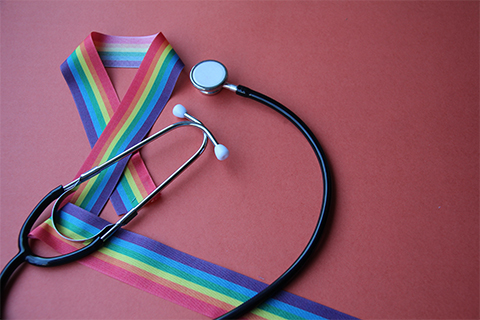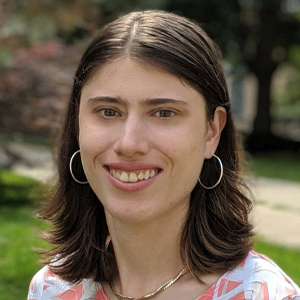
Breaking ground in LGBTQIA+ health
When I was a graduate student in chemistry, I felt prepared for and (somewhat) knowledgeable about the expectation that I needed to complete a postdoc as the next step in my training to become a bench scientist. I didn’t know until I was in my current position, five years later, that medical doctors also have an optional stage of specialized training after residency called fellowships.
Today, I am a graduate medical education coordinator and manage several fellowships in the Department of Family Medicine and Community Health at the University of Wisconsin–Madison. These programs offer opportunities for clinicians to spend a year or two practicing and learning in a specific field.

In 2021, the American Medical Association Foundation awarded our school of medicine and public health the funding to support its first national LGBTQ+ Health Fellowship. We are graduating our first two trainees in the program this year.
What is it?
The program supports one or two physicians each year as they are trained and equipped to serve LGBTQIA+ populations. Our trainees must have completed a residency in family medicine, internal medicine, pediatrics or combined internal medicine-pediatrics and be on track for an academic or clinical career in primary care.
The goal of this one-year fellowship is to prepare physicians to improve primary care in the LGBTQIA+ community, advance health equity and become leaders in providing health care for individuals of all genders.
If you are an M.D. or D.O., depending on where you complete your residency, you may or may not feel prepared to tackle these issues. If this is an area you are especially passionate about, taking a year after your residency to focus on the health needs of the LGBTQIA+ community may be a great opportunity.
Muhammad Daud is one of the program’s first fellows. “I’ve seen firsthand the immense barriers that LGBTQ folks face within our health care system,” he said. “Medical education often fails to adequately prepare providers to offer robust care to sexual and gender minority patients. That’s why I chose to do this fellowship — to expand my clinical skills and academic knowledge to better care for the new diverse and authentic American family.”
Community engagement
New medical fellows are often surprised by how much time in a fellowship is unstructured. In the LGBTQ+ Health Fellowship, blocks are set aside for academic work; the fellows make their ownschedules and work on scholarly projects at their own pace. This year’s fellows helped design curriculum in collaboration with the Midwest AIDS Training and Education Center and co-authored an expert opinion piece on the HIV risk reduction plan known as pre-exposure prophylaxis, or PrEP. Overall, unstructured activities take up about 50% of their time; they spend about 30% in clinical rotations and the remaining 20% in one of the UW Health primary care clinics.
At the UW School of Medicine and Community Health, our LGBTQ+ health fellows spend one day each week in a primary care clinic, several half days per week practicing at sites focused on the LGBTQIA+ community and several days per month attending education sessions.
Each UW fellowship is unique. This one breaks the year into 12 one-month blocks of focused learning on LGBTQ+ health care and community issues. For example, during a month focused on pediatric and adolescent medicine, fellows rotate through UW health clinics, including those that support transgender, nonbinary, gender-questioning, and gender-diverse youth. While working at these clinics, the fellows attend learning sessions where they can discuss and ask questions about the medical needs of this community. Many community-based groups have welcomed our fellows into their space for education and engagement.
Months that focus on reproductive, sexual and behavioral health and geriatrics also emphasize clinic work.
While developing this program, our curriculum team recognized that the fellows need to spend time engaging with community needs. Therefore, the program includes blocks of time focused on advocacy and anti-oppression, where fellows meet with community leaders and participate in events such as Trans Law Help Wisconsin’s Name & Gender Marker Change Clinic.
Finding a focus
If you’re a med student or M.D. looking into fellowships, it’s important to understand the structure and to consider what best fits your interests and career goals.
The U W LGBTQ+ Health Fellowship encourages self-exploration. Fellows can work on developing specific skills, and each fellow is encouraged to follow their ownpath to become the kind of LGBTQIA+ health leader they imagine.
During the second half of the year, fellows get to build a four-week curriculum based on their experiences in the first six months. They can return to a specific clinic or site to gain more experience in that area, start a new project or travel to gain experience in other locations.
The structure can vary among LGBTQ+ fellows working at different organizations. Some may focus on clinical time and case studies while others focus more on teaching and learning. Some will incorporate community work into their clinics, while others will have separate time for advocacy and community projects.
Fellows take part in designing their curriculum. For example, our first fellows had a particular interest in HIV care in urban areas, but we couldn’t offer this experience in largely rural and suburban Madison. The fellows connected with a local clinic focusing on HIV care that has a partner clinic in Milwaukee. They brought us a proposal to work there, and we were able to support a two-week rotation in that city.
Regular personal mentoring with our fellowship directors and core faculty and goal-orientated training further support fellows; they leave with comprehensive skills and the confidence to be leaders in LGBTQIA+ health.
This program is one way the AMA Foundation fulfills its mission to limit health-care inequities. More medical schools are applying for competitive AMA Foundation Fellowship Program funding. In 2022, Harvard and Vanderbilt were awarded funding to start programs at their institutions.
Enjoy reading ASBMB Today?
Become a member to receive the print edition four times a year and the digital edition monthly.
Learn moreGet the latest from ASBMB Today
Enter your email address, and we’ll send you a weekly email with recent articles, interviews and more.
Latest in Opinions
Opinions highlights or most popular articles

Women’s health cannot leave rare diseases behind
A physician living with lymphangioleiomyomatosis and a basic scientist explain why patient-driven, trial-ready research is essential to turning momentum into meaningful progress.

Making my spicy brain work for me
Researcher Reid Blanchett reflects on her journey navigating mental health struggles through graduate school. She found a new path in bioinformatics, proving that science can be flexible, forgiving and full of second chances.

The tortoise wins: How slowing down saved my Ph.D.
Graduate student Amy Bounds reflects on how slowing down in the lab not only improved her relationship with work but also made her a more productive scientist.

How pediatric cataracts shaped my scientific journey
Undergraduate student Grace Jones shares how she transformed her childhood cataract diagnosis into a scientific purpose. She explores how biochemistry can bring a clearer vision to others, and how personal history can shape discovery.

Debugging my code and teaching with ChatGPT
AI tools like ChatGPT have changed the way an assistant professor teaches and does research. But, he asserts that real growth still comes from struggle, and educators must help students use AI wisely — as scaffolds, not shortcuts.

AI in the lab: The power of smarter questions
An assistant professor discusses AI's evolution from a buzzword to a trusted research partner. It helps streamline reviews, troubleshoot code, save time and spark ideas, but its success relies on combining AI with expertise and critical thinking.

